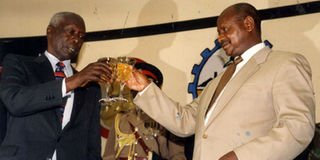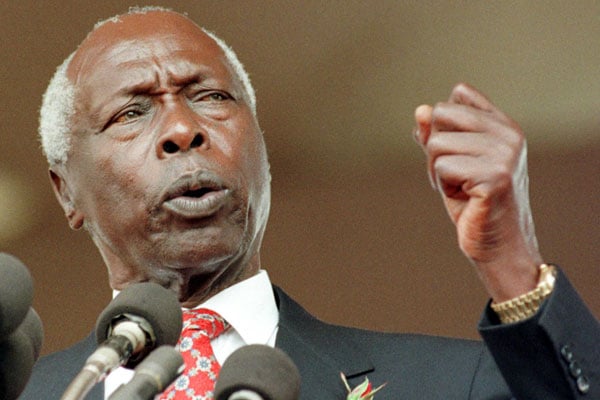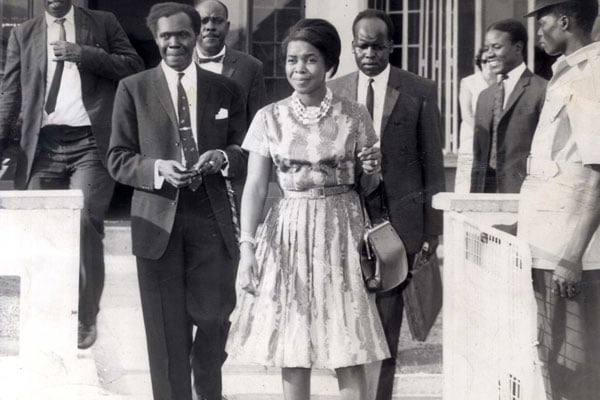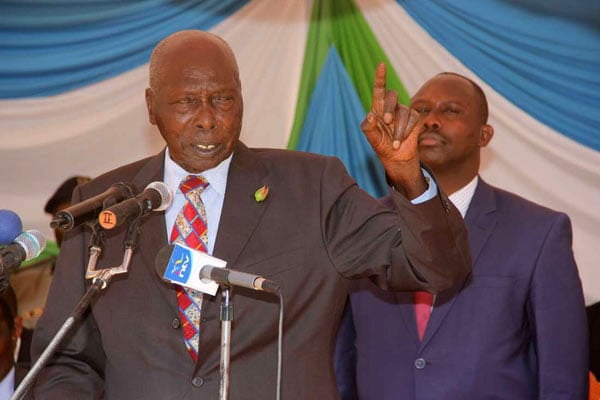How Museveni, Moi dealt with rebel links

Earlier days. Former President Daniel arap Moi toasts with Mr Museveni in the 1990s. File photo
What you need to know:
- "The misunderstanding was based on mutual mistrust. Moi had survived a coup in 1982 spearheaded by the left leaning Kenyans. The elements of the coup escaped and were thought to be in Uganda. Even Raila Odinga came by boat up to Iganga. Some of us who had initial suspicion when Museveni took power also fled to Kenya and this created difficult relations between the two countries,” Aggrey Awori, former minister
Former Kenyan president Daniel arap Moi died Tuesday morning in a Nairobi hospital after a long illness. Moi ruled Kenya for 24 years until 2002 when he retired.
As Moi was consolidating himself in power, a new bull in the neighbouring kraal emerged across the border - President Museveni.
Mr Museveni had been a student of leftist political view since his school days and associated with socialism yet Moi believed in capitalism. Both leaders accused each another of harbouring dissidents against either country.
The simmering conflict exploded in December 1987 when Kenya expelled two Ugandan diplomats. Prior to that, six Kenyan agents had been arrested on the Ugandan side of the border.
For months, the two leaders had traded accusations and in October 1987, security forces from the two neighbouring countries exchanged fire at Busia border.
Mr Museveni, whose army was fighting different dissident groups at the time, accused Kenya of aiding rebels opposed to his rule.
He counter-deployed Ugandan troops on the border to halt the suspected Kenya-supported guerrillas from making cross-border raids.
Mr Museveni said the Kenya-based rebels were killing civilians, including elected government councillors, and issued a list of suspected rebels whom Uganda said were using Kenyan territory to launch incursions into Uganda, a claim the Kenya government denied.
Moi, who was battling insurgents fighting his pro-West government, warned that any attempt by Uganda to send troops across the border would be met with fierce retaliation.
Over the years, Moi grew increasingly concerned about subversive activity in his country. He fought a clandestine internal group, known as Mwakenya, which he said was Communist inspired, and was worried that Libya could use Ugandan territory to destabilise his country.
Moi accused Uganda and Libya of plotting against his government, forcing him to expel six Libyan diplomats, including the charge d’affaires within six months, for alleged espionage.
Through his mouthpiece, The Kenya Times, Moi had accused Libyan troops of supporting Museveni’s forces in battles against Ugandan rebels in northern and eastern Uganda. Kenya also accused the Ugandan army of spying, abducting Kenyans and cattle rustling at the border.
READ
Uganda denied the claims and shortly before his expulsion, the Ugandan High Commissioner in Nairobi, Mr Charles Kakuru Katungi, said Ugandan troops were stationed at the border to ensure Ugandan rebels did not attack the country from Kenya.
This angered Kenya, and it accused Mr Katungi of heaping “incredible insult on the person of His Excellency President Daniel Toroitich Arap Moi.”
With the crisis worsening, Mr Katungi and his deputy were expelled. Katungi at the time said allegations of Libyan involvement on the border were “absolutely ridiculous.”
Mr Aggrey Awori, a former Museveni critic who challenged him for presidency in 2001, later “converted” to the ruling NRM party and was appointed minister.
He said Uganda and Kenya almost went to war because of mutual mistrust that each was harbouring dissident elements of either country.
In 1982, members of Kenya Air Force organised a coup to topple Moi but they were defeated. It was believed that some of the architects escaped and were still hiding in Uganda by the time Mr Museveni’s rebels took over power.
Reconciliation talks
Mr Awori said the supposed dissidents in Kenya also had socialist views and therefore, Mr Museveni’s belief in socialism and his association with Libyan leader Muamar Gaddafi created more suspicion.
He, however, said Kenya started feeling isolated within the East African region, with Tanzania backing Uganda for historical reasons.
Tanzania had helped Uganda to oust Idi Amin in 1979 and one of the individuals who played a part in the ouster was Mr Museveni.
“Kenya was getting increasingly isolated in the East African Community because Tanzania was sympathetic to Uganda because of obvious reasons. A lot of abductions had taken place and Moi was keen to restore the relations with Uganda. This, he said, would dispel the fears and assure Ugandans that Kenya was not hosting any rebel groups in Kenya,” Mr Awori said.
“It is on this basis that some of us were asked to leave Kenya and assure Museveni that none of the people who were against him were being hosted in Kenya. Both Kenya and Uganda realised that they could not sustain their economies that were interdependent.Museveni realised that he could not entirely sustain Uganda’s economy based on one route through Tanzania and Moi also knew that he could not do without Uganda, the biggest importer of manufactured products from Kenya,” he added.
On December 1987, the two leaders met at the Kenyan border side of Malaba Town and agreed to normalise relations.







